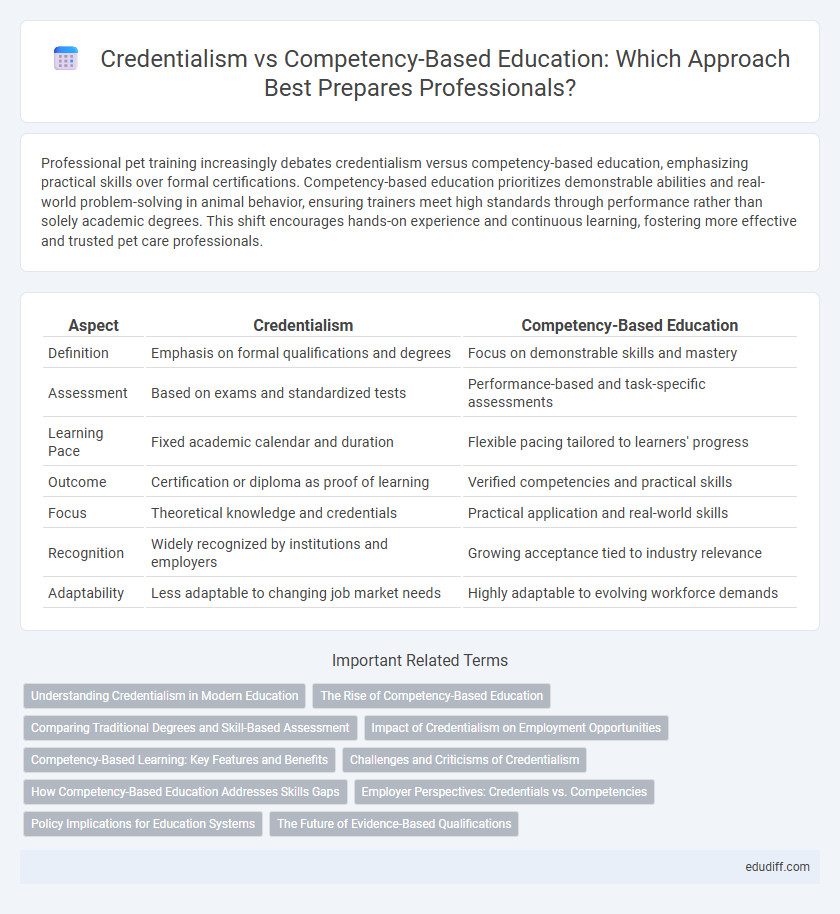Professional pet training increasingly debates credentialism versus competency-based education, emphasizing practical skills over formal certifications. Competency-based education prioritizes demonstrable abilities and real-world problem-solving in animal behavior, ensuring trainers meet high standards through performance rather than solely academic degrees. This shift encourages hands-on experience and continuous learning, fostering more effective and trusted pet care professionals.
Table of Comparison
| Aspect | Credentialism | Competency-Based Education |
|---|---|---|
| Definition | Emphasis on formal qualifications and degrees | Focus on demonstrable skills and mastery |
| Assessment | Based on exams and standardized tests | Performance-based and task-specific assessments |
| Learning Pace | Fixed academic calendar and duration | Flexible pacing tailored to learners' progress |
| Outcome | Certification or diploma as proof of learning | Verified competencies and practical skills |
| Focus | Theoretical knowledge and credentials | Practical application and real-world skills |
| Recognition | Widely recognized by institutions and employers | Growing acceptance tied to industry relevance |
| Adaptability | Less adaptable to changing job market needs | Highly adaptable to evolving workforce demands |
Understanding Credentialism in Modern Education
Credentialism in modern education emphasizes the acquisition of formal qualifications as proof of knowledge and skills, often prioritizing diplomas and certificates over actual competencies. This approach can create barriers to employment and advancement by valuing credentials above practical experience and abilities. Understanding credentialism is crucial for developing more effective competency-based education systems that focus on measurable skills and real-world performance.
The Rise of Competency-Based Education
Competency-based education (CBE) has gained momentum as an alternative to traditional credentialism by emphasizing mastery of specific skills and knowledge over time-based degree attainment. This approach aligns educational outcomes with industry demands, promoting workforce readiness and personalized learning pathways. Employers increasingly value demonstrable competencies, driving academic institutions to integrate CBE frameworks that prioritize practical expertise and continuous assessment.
Comparing Traditional Degrees and Skill-Based Assessment
Traditional degrees emphasize formal credentials and years of study as proof of knowledge, often prioritizing theoretical understanding over practical skills. Competency-based education centers on demonstrated abilities and real-world application, using skill-based assessments to validate proficiency regardless of time spent in classrooms. Employers increasingly value competency-driven credentials for their direct relevance to job performance and adaptability in dynamic work environments.
Impact of Credentialism on Employment Opportunities
Credentialism often prioritizes formal degrees and certifications over practical skills, creating barriers for capable individuals without traditional qualifications. Employers may overlook qualified candidates lacking specific credentials, limiting diversity and innovation within the workforce. This emphasis on credentials can perpetuate inequities and reduce the focus on actual competency and job performance.
Competency-Based Learning: Key Features and Benefits
Competency-Based Learning prioritizes mastery of specific skills and knowledge over time spent in class, allowing learners to progress at their own pace. Key features include personalized learning pathways, continuous assessment, and real-world application of skills, ensuring practical competence. This approach enhances employability by aligning education with industry standards and measurable outcomes.
Challenges and Criticisms of Credentialism
Credentialism faces criticism for emphasizing formal qualifications over practical skills, often leading to inflated job requirements that exclude capable candidates without traditional credentials. This reliance on degrees can perpetuate social inequalities by limiting access for underrepresented groups who may lack resources to pursue extensive education. Employers may also miss out on competent talent whose skills are not formally certified, challenging the effectiveness of credential-based hiring practices.
How Competency-Based Education Addresses Skills Gaps
Competency-based education (CBE) directly targets skills gaps by emphasizing mastery of specific skills and knowledge rather than accumulation of credits or degrees. It allows learners to progress at their own pace, demonstrating proficiency through assessments that mirror real-world job requirements. Employers benefit from a workforce trained in precise competencies, reducing mismatches between education outcomes and labor market needs.
Employer Perspectives: Credentials vs. Competencies
Employers increasingly prioritize competency-based education as it directly aligns with job performance and practical skills, reducing reliance on formal credentials as sole indicators of employee capability. Data from the National Association of Colleges and Employers (NACE) reveals 78% of employers rate demonstrated skills above academic degrees when hiring recent graduates. This shift reflects a growing recognition that competencies such as critical thinking, technical proficiency, and communication predict workplace success more reliably than traditional credentials.
Policy Implications for Education Systems
Policy implications for education systems highlight the tension between credentialism, which prioritizes formal degrees as gatekeepers for employment, and competency-based education, which assesses skills and practical knowledge directly. Shifting toward competency-based models can reduce barriers to workforce entry and better align educational outcomes with labor market needs, prompting policies that emphasize skill verification over traditional credentials. Education systems must adapt regulatory frameworks and funding incentives to support transparent competency assessments and lifelong learning pathways.
The Future of Evidence-Based Qualifications
The future of evidence-based qualifications emphasizes competency-based education, prioritizing practical skills and demonstrable expertise over traditional credentialism. This shift enables employers to assess candidates through real-world performance and validated competencies rather than relying solely on academic degrees. Advancements in digital credentialing and assessment technologies further support transparent, verifiable, and adaptive qualification frameworks aligned with workforce demands.
Credentialism vs Competency-based Education Infographic

 edudiff.com
edudiff.com